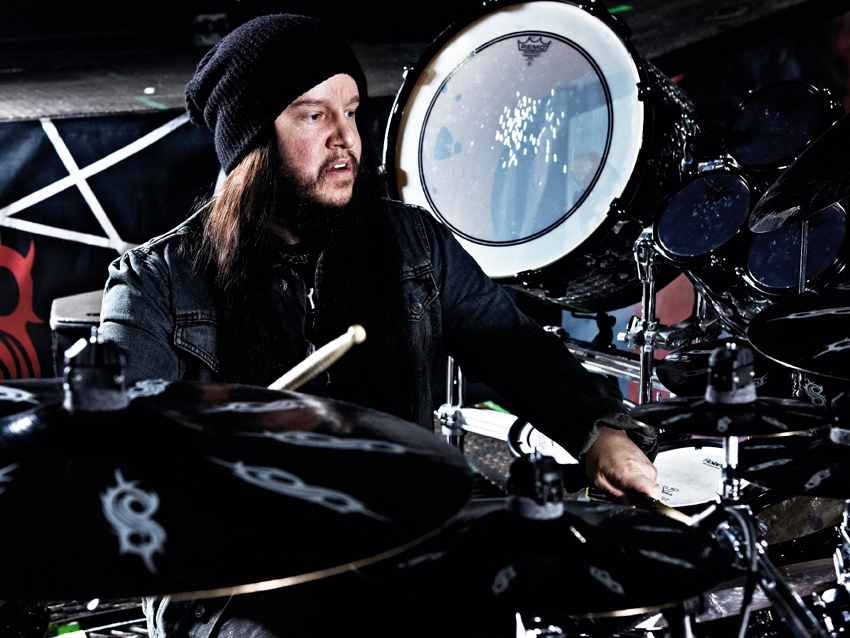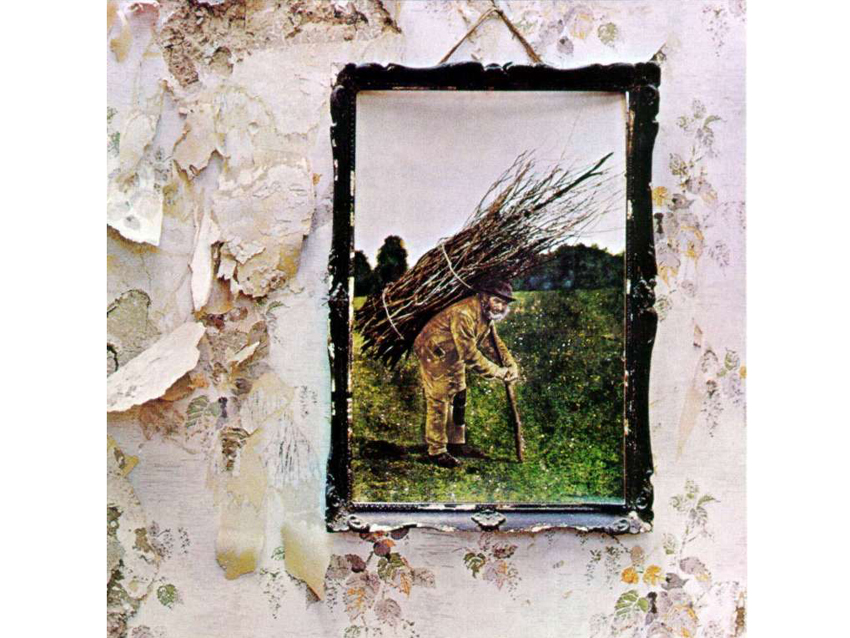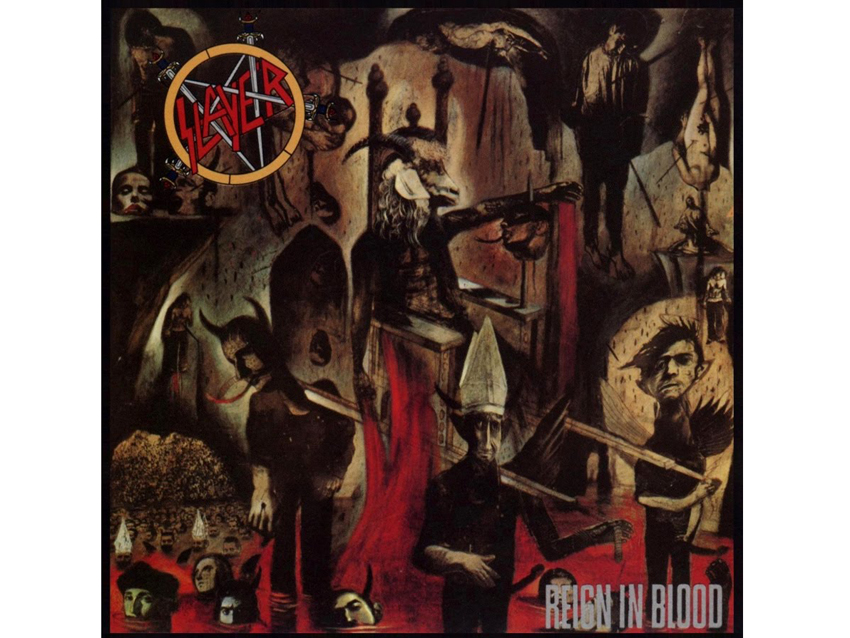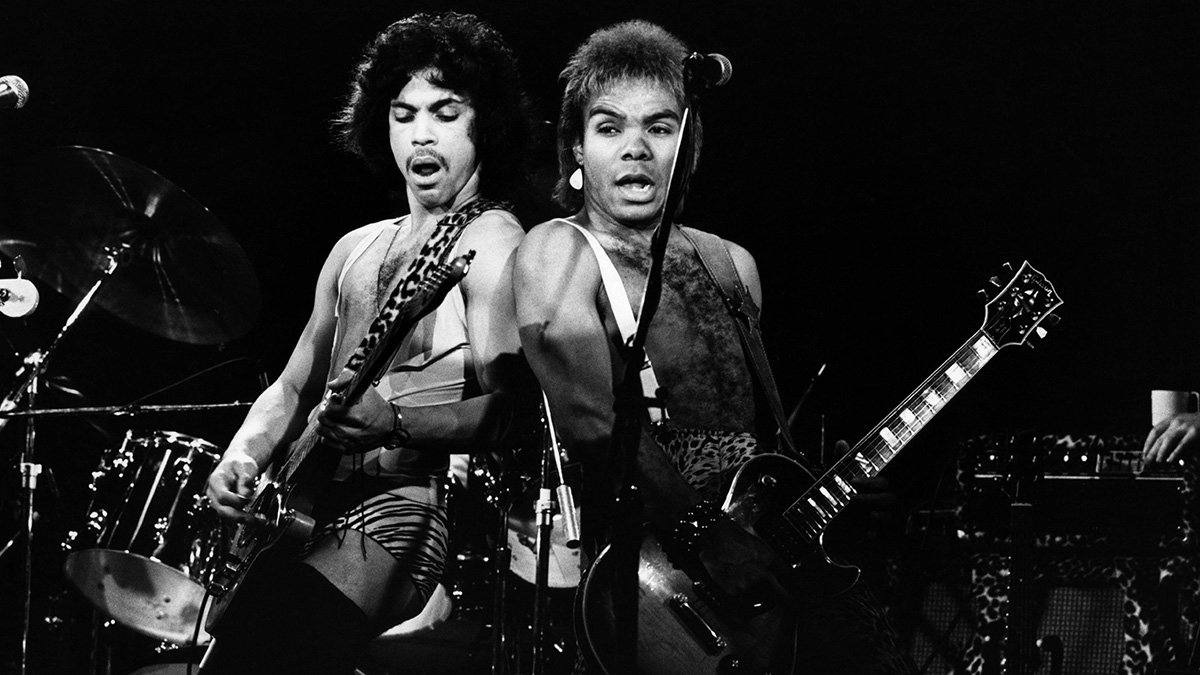
Joey Jordison picks 10 essential drum albums
Since the release of Slipknot's self-titled debut in 1999, Joey Jordison's highly advanced, rapturous drumming has influenced legions of players across the globe. When it comes to his criteria of what constitute essential drum recordings, the double bass drum virtuoso has some pretty exacting standards.
“The drum records that I like are ones on which the drumming didn’t repeat itself," Jordison says. "The players didn’t stick to a format or formula. Part of that reason is also because of the quality of the material. On the records that I grew up with and loved, every song was unique – it’s almost as if you had a different journey every time – and the drums were big part of that story."
Beyond the compositional and performance issues, Jordison is also of the mind that sonics play a huge part in essential drum recordings. “A great drum record has to sound good; in fact, it should sound special," he says. "It should capture the richness and the actual tones of the drums themselves, regardless of who is playing."
Although he's regarded as a modern metal master, Jordison admits that a lot of his aesthetic sensibilities come from records of decades past. "I love listening to old records," he says. "Stuff from the ‘70s, even disco and funk records and a lot of early rock albums – what’s great about those recordings is that you can actually hear the true tones of the drums themselves. Modern production has removed a lot of those characteristics. You don’t hear the shells of the drums on so many new recordings, which is sad."
Recently, Jordison formed a new band, Scar The Martyr, and on the group's forthcoming self-titled debut, due out October 1st, he practices what he preaches when it comes to sonics. "Drums are the foundation of the music for me; they’re the core of the song," he says. "On some records I’ve done, I’ll track some guitars just a little bit for vibe. I didn’t do that this time. When I laid down bass, I took all the guitars out, so it was just me and drums. That actually let some of the drum hits stick out and breathe more."
Jordison tracked the album at Sound Farm Studios in Jamaica, Iowa, the same facility where Slipknot recorded 2008's All Hope Is Gone. The drummer has worked on a few projects at the studio, and through trial and error over the years, he says that he's found the sweet spots of the room. "You have to put the time in for stuff like that, which people don’t want to do these days," he says. "It’s a puzzle sometimes, but you have to work at it to get a record that has some life to it. The people back in the ‘60s and ‘70s knew that."
Expanding on his thoughts on recording drums, Jordison says, “In some ways, things are too easy these days. You’ve got Pro Tools and triggers; you’ve got studios packed in closets. It used to be a really big deal to get into a studio and set up the mics – you’d sit there tuning for hours. You actually had to get great at tuning your drums, and you had to put the kit in four different places to find the sweet spot. The way it works now is, you tune your drums pretty good and people just throw samples on them. That robs drum recordings of their character. I'll take a record where the drums have character over so-called perfection any day."
On the following pages, Jordison runs down his picks for 10 Essential Drum Albums. You can pre-order Scar The Martyr's debut album at this link. And for a list of upcoming Scar The Martyr tour dates, click this link.

KISS - Alive! (1975)
“This was a huge influence on me, and it wasn’t just for the drumming. It got me into heavy rock – my whole journey, basically. It came out the year I was born, so I didn’t catch on to it until seven or eight years after the fact. It’s still one of my favorite records because it set up so many of the areas that I’m involved with.
“I remember playing the record constantly, just flipping it over and over countless times. And then there was the cassette and the CD – three CDs have been either lost or broken. I’ve had copies of it on every format.
“KISS Alive! remains my staple influence. The drum solo of 100,000 Years is an eighth-note masterpiece. The impact of that, again, was so instrumental in getting me involved in the music that I was going to play during my lifetime.”

Led Zeppelin - Led Zeppelin IV (1971)
“I have to admit that what caught me early on was the Page/Plant thing. The two of them were so up-front in the mix – Plant with his haunting voice and Page with those absolutely sick riffs – that I was drawn to them instantly.
“Because of that, I completely blocked out the rest of the music for a while. But when I realized what John Bonham was doing, and just how brilliant he was, that’s when my musical journey seriously began. KISS got me interested in music, but Led Zeppelin – and Led Zeppelin IV, in particular – put me on my path as a musician.
“Misty Mountain Hop is the ultimate groove, but of course, you’ve got Black Dog. I mean, listen to those stops – people still can’t nail them because they're different every time. It’s one of those classic things where people will air-drum to it, and they’ll always miss that first hit. I’ve listened to it so many times, and it’s always surprising to me. That’s because it was the band jamming in a live room – there was no click track.
“Led Zeppelin IV still sounds fresh to me. Recording was very open and free back then. Whatever the band wanted to do, they did. Nobody will ever be able to match John Bonham’s wide-open drum sound. It’s the best I’ve ever heard – ever.”

Black Sabbath - Black Sabbath (1970)
“I can’t mention Led Zeppelin IV without including the first Black Sabbath record. Bill Ward is on the same plane as John Bonham, although he’s a very different player. Bonham had this full, in-your-face ferocity and such a groove – even if you didn’t like Zeppelin, you got sucked in because of his backbeat.
“With Black Sabbath, it was more haunting overall. Bill Ward’s drums were like a constant tom roll; he had a very jazzy swing, which actually made the guitar riffs sound crazy. A lot of guitarists will want to kill me for saying this, but if you took away the drums, those riffs wouldn’t sound as demonic. Bill added something very necessary to the sound and the impact of the band.
“Listen to the song Black Sabbath. In the middle, when Bill crashes into the full-time and Geezer starts going crazy, it’s all improv. That’s what I love about this shit: They were saying, ‘OK, we’re recording. We know we’re supposed to jam here. Fuck it, it’s on the fly.’ You can hear the honesty. Bill didn’t practice it or orchestrate it; he wasn’t doing what he thought was best for the vocal – none of that. He just played what he felt when he felt it, and that’s the track that went out all over the world that people still listen to.”

The Rolling Stones - Tattoo You (1981)
“The song that really gets me is the last one on this record, Waiting On A Friend. The reason why I like it is because it’s all about the cross-stick. Charlie has a way of taking his stick off the hi-hat when he hits the snare, and when you put that behind Jagger’s vocal, it sets a mood so beautifully.
“It’s so good, in fact, that you could take the rest of the band out, and it would still sound magical. That’s the beauty of what a drumbeat can do. Think about it: If you didn’t have the cross-stick in that song, you’re fucked. It just wouldn’t be happening. What Charlie Watts does on Waiting For A Friend sends chills up my spine.
“He’s such an amazing drummer. He never felt like he had to do these big fills or play on the toms all the time. It’s like he fooled everybody, you know? Here he is, he’s a part of the biggest fucking rock band in the world, and he wins by simple taste.”

Ace Frehley - Ace Frehley (1978)
“This is Ace’s first solo album, and Anton Fig is the drummer. On the song Rip It Out, which is the first track on the record, there’s a drum break before the guitar solo, and it’s just incredible.
“Being a KISS fan already, I was way into Peter Criss, but when I heard this, when he goes into the single-note quad fills, I was like, ‘What in the world it that?’ I’d never heard anything like it. Anton does these quad fills between two toms and a kick, and it’s the coolest-sounding thing. I was sitting there going, ‘Fuckin’ A, man. Who is this Anton Fig?’ That’s how I got into him, from this record.
“The groove on Snow Blind is great, and the drumming on Ozone and Fractured Mirror is fantastic. The whole record is cool from front to back.”

Terrorizer - World Downfall (1989)
“This is the side band that Pete Sandoval and David Vincent from Morbid Angel did a while ago. It features Oscar [Garcia] from Nausea singing, and on drums is Jeese [Pintado] from Napalm Death. He passed away a few years ago, God rest his soul. It’s my favorite grindcore record.
“I love the drum tone, which is so raw. It was recorded live, so there was no time to fix things, and it's fucking flawless. One of the most inspiring speed records ever – totally unbeatable.”

Slayer - Reign In Blood (1986)
“This is similar to Terrorizer’s World Downfall in that it’s a short record, and the drumming is fucking unreal. Without Dave Lombardo, I probably wouldn’t be playing drums. He’s where I got my speed.
“I got into this record when it came out, which was the same year that Metallica released Master Of Puppets. A couple of friends of mine were listening to thrash metal, and they told me about it. I was floored when I heard it, and to this day, I think it’s amazing. As far as speed metal goes, Reign In Blood is unrivaled when it comes to the drums.
“Rick Rubin totally nailed the drum tone. It has the same quality that I like about World Downfall – that impeccable rawness. You don’t hear studio tricks; instead, you can hear the player. You can almost hear Dave breathe – it’s that real.
“When you put a bunch of mikes on stuff, you lose a lot of the life because you have gates and compressors and shit. It sounds good, but you’re not really hearing the life behind the kit. On Reign In Blood, you hear Dave Lombardo play like he’s right in front of your face.”

Metallica - Ride The Lightning (1984)
“Master Of Puppets and Ride The Lightning have the same format, as almost does …And Justice For All – you’ve got four songs on side A, four songs on side B. You’ve got the ballad for song four – very similar.
“I like Ride The Lightning because it’s got a little more rawness to it – that appeals to me on some of these records. You can see that they sort of do the same type of thing: Fight Fire With Fire against Battery – which one's better? They’re both great. But I love the double bass breakdown in Fight Fire With Fire, where everything drops out, but you’ve got Lars just going straight on the 16th notes on the double bass. That gives me chills.
“Trapped Under Ice is a speed-metal classic – another one of Lars’ brilliant performances. The whole record is great.”

The Who - Who's Next (1971)
“This is a real toss-up between Who’s Next and Quadrophenia. I mean, how can you pick? Keith Moon is one of my biggest idols. I’d have to go with Who’s Next, though. I love Quadrophenia, of course, but I think Who’s Next shows off Moon’s talent a little more.
“I just love his unpredictability. You can hear it on every Who record. I also love the tightness on his snare and the way the kick drum was kind of choked. Nobody matches Bonham on the kick drum, but Keith definitely had his own style.
“And listen to what Moon did on the toms. He was such an abstract tom player. I don’t know how planned out his parts were, but as a listener, I’m still surprised at what he did every time I hear it. I can sit there and air-drum to the whole thing, but there will always be something that I’m off on.
“What he did is confusing, but I get such enjoyment from listening to him. He’s like a mystery drummer to me. You can imagine Townshend and Entwistle thinking that they don’t want to tell him to calm down, because he’s doing what he’s doing, and he’s all over the place. Sometimes he’s completely off in his own world. That’s what I’ve always loved about Keith Moon.”

Billy Cobham - Spectrum (1973)
“I never really gave this record much credit before in interviews, but it’s one that I grew up on. My uncle Dougie gave it to me, and while I didn’t think too much of it at the time, now I have to give it a proper mention. A lot of drummers today wouldn’t be what they are without it.
“Red Baron, Stratus, Taurian Matador – fuck, dude, they're incredible. Not only is this one of the baddest ass-sounding records of its time, but it’s got Cobham doing double bass straight-up off the first track. He was one of the first guys in that field who was even doing double bass. It’s crazy!
“This is one of those records that I’ll forget about for a while, but every time I go back to it I’m floored. I’m constantly re-inspired when I hear it. If I ever get stuck on something, I’m like, ‘OK, I’d better go back and listen to Spectrum.’”

Joe is a freelance journalist who has, over the past few decades, interviewed hundreds of guitarists for Guitar World, Guitar Player, MusicRadar and Classic Rock. He is also a former editor of Guitar World, contributing writer for Guitar Aficionado and VP of A&R for Island Records. He’s an enthusiastic guitarist, but he’s nowhere near the likes of the people he interviews. Surprisingly, his skills are more suited to the drums. If you need a drummer for your Beatles tribute band, look him up.
"At first the tension was unbelievable. Johnny was really cold, Dee Dee was OK but Joey was a sweetheart": The story of the Ramones' recording of Baby I Love You
"Reggae is more freeform than the blues. But more important, reggae is for everyone": Bob Marley and the Wailers' Catch a Fire, track-by-track
"At first the tension was unbelievable. Johnny was really cold, Dee Dee was OK but Joey was a sweetheart": The story of the Ramones' recording of Baby I Love You
"Reggae is more freeform than the blues. But more important, reggae is for everyone": Bob Marley and the Wailers' Catch a Fire, track-by-track









